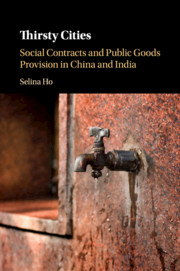‘An excellent study on the differential performances of China and India in distributing public goods provisions. With the aid of case studies of water supply in four Chinese and Indian cities, Selina Ho captures an enduring puzzle as to why India lags behind China in offering collective goods to its population, despite its democratic credentials. A must read for all interested in development as well as all politicians and bureaucrats in India!'
T. V. Paul - James McGill Professor of International Relations, McGill University, Canada
'Selina Ho's Thirsty Cities is an original, ingenious, and admirably researched account that sets out to explain why China's cities provide a much higher level of drinking water than do India's. But the book goes far beyond that. It introduces a novel concept, the ‘social contract' - an informal institution that serves as an implicit agreement between leaders to rule in a manner that, to establish their own legitimacy, meets citizens' expectations. Using it, Ho skillfully contrasts China's with India's mode of governance in recent decades and thereby explicates a great deal about their divergent regimes. China's government, which fosters capacity and local government autonomy, is grounded in material-cum-moral performance, while India's (despite its democracy) is situated in ideals of socialism and populism, which afford far less administrative efficacy, she demonstrates. A book with wide applicability across the globe today.'
Dorothy J. Solinger - Professor Emerita, University of California, Irvine
‘This book wrestles intelligently with the puzzle of why an authoritarian regime, China, is more proficient at providing essential public goods than a robust democracy, India. This counter-intuitive outcome is the subject of this important work by Selina Ho. She highlights the crucial role of informal institutions and normative principles in explaining service provision as determinant rather than regime type or other factors. The work is essential reading for anyone interested in the relationship between the politics of welfare, regime type and public goods provision.'
Tony Saich - Daewoo Professor of International Affairs, Director, Ash Center for Democratic Governance and Innovation, Harvard Kennedy School



